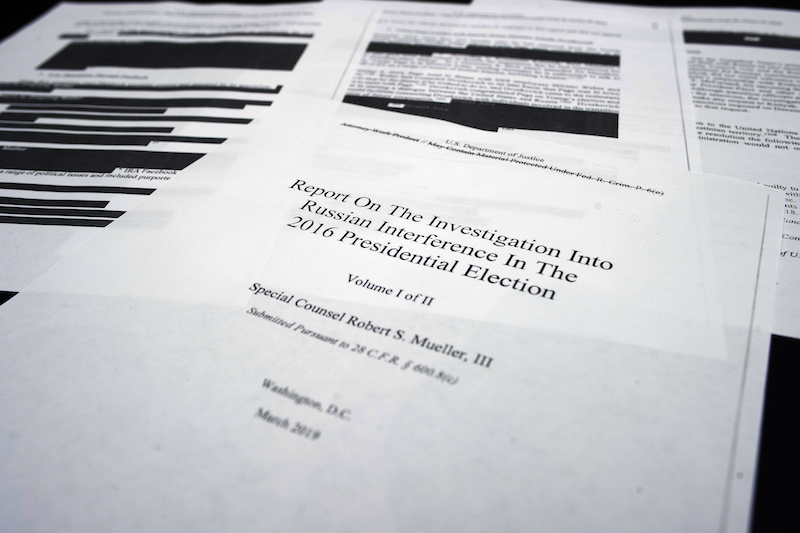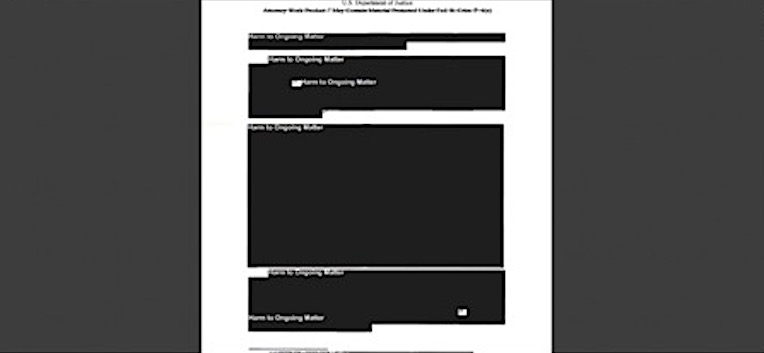Five Critical Takeaways From the Mueller Report
Here’s one: No one is above the law. Four pages of the Mueller report sit on the witness table in the House Intelligence Committee hearing room on Thursday. (Cliff Owen / AP)
Four pages of the Mueller report sit on the witness table in the House Intelligence Committee hearing room on Thursday. (Cliff Owen / AP)
After nearly two years of waiting, we have a redacted version of the report of special counsel Robert Mueller. A searchable copy can be found and examined here.
The report is 448 pages long and is divided into two volumes. Volume I, in the words of the report, “describes the factual results of the Special Counsel’s investigation of Russia’s interference in the 2016 presidential election and its interactions with the Trump Campaign.” If you are concerned about allegations of conspiracy, cooperation or “collusion” (more on that misnomer ahead) between the campaign and persons associated with the Russian government, this is where you will find Mueller’s reasoning.
Volume II “addresses the President’s actions towards the FBI’s investigation into Russia’s interference in the 2016 presidential election and related matters, and his actions towards the Special Counsel’s investigation.” If you are interested in learning whether the 45th president of the United States obstructed justice in connection with the Russian investigation, this is where you should focus your attention.
Volume II discusses 11 alleged instances of possible obstruction, covering, among other subjects, the firing of former FBI Director James Comey in May 2017, and the president’s directive in June 2017 to then-White House counsel Donald McGhan to fire Mueller—an order McGhan refused to carry out, fearing another “Saturday Night Massacre.”
Each volume is preceded by a detailed executive summary. The report also includes four appendixes, lettered A through D, that total 53 pages. Appendix C contains Trump’s answers to the written interrogatories sent to him by the special counsel’s office, which Trump’s legal team provided last November.
On the whole, the report is moderately redacted. However, key segments of the report are entirely blacked out, including details about Mueller’s decision not to cite members of the Trump campaign for conspiracy. Consider, for example, page 28 of volume I:

Although it will take time to digest the entire redacted report, here are five critical takeaways:
- Do Not Trust Anything Attorney General William Barr Has Said About the Report. Read the Report Yourself.
If you want to understand the Mueller report, the last thing you should do is rely on Barr’s attempts to summarize Mueller’s findings. You can read analyses like mine or any number of others written by experts in criminal and constitutional law that will be published in the coming days, but there is no substitute for the hard slog of studying the report yourself.
Barr’s press conference Thursday morning, staged ahead of the report’s release, contained his most misleading statements to date. Crossing the line from spinning to outright lying, he remarked five times during the brief televised event that Mueller had concluded “there was no evidence of Trump campaign ‘collusion’ with the Russian government’s hacking [of the DNC’s emails].”
As elaborated below, that is not what the report says.
On obstruction, Barr falsely claimed that the White House had “fully cooperated” with the Mueller probe. It didn’t. The report makes crystal clear, among other things, that Trump refused to be interviewed by the special counsel.
Barr also remarked at his press conference that the president was “frustrated and angered” by the probe, implying that anger and frustration could provide the president with a legal defense to obstruction charges.
Not so.
The crime of obstruction of justice requires the corrupt intent to impede an official proceeding. Anger and frustration have no bearing on corrupt intent.
At the press conference, as in his previous letters to Congress, Barr acted more like the president’s personal attorney than the highest-ranking member of the Justice Department.
- Mueller Did Not Find There Was No Evidence of Conspiracy. Nor Did He Make Any Finding on the Misnomer of Collusion.
The report did not conclude, as Trump, Barr, and, sadly, even some Mueller skeptics on the left have claimed, that there was no evidence of conspiracy or collusion.
Rather, the report states, “[W]hile the investigation identified numerous links between individuals with ties to the Russian government and individuals associated with the Trump Campaign, the evidence was not sufficient to support criminal charges.”
This does not mean that the probe failed to uncover any evidence of conspiracy. It means that the evidence fell short of the exacting criminal-law standard of proof beyond a reasonable doubt.
To quote directly from the text:
“The report describes actions and events that the Special Counsel’s Office found to be supported by the evidence collected in our investigation. In some instances, the report points out the absence of evidence or conflicts in the evidence about a particular fact or event. In other instances, when substantial, credible evidence enabled the Office to reach a conclusion with confidence, the report states that the investigation established that certain actions or events occurred. A statement that the investigation did not establish particular facts does not mean there was no evidence of those facts.” [Emphasis added.]
As for collusion, Mueller and his colleagues wrote:
“In evaluating whether evidence about collective action of multiple individuals constituted a crime, we applied the framework of conspiracy law, not the concept of ‘collusion.’ In so doing, the Office recognized that the word ‘collud[ e ]’ was used in communications with the Acting Attorney General confirming certain aspects of the investigation’s scope and that the term has frequently been invoked in public reporting about the investigation. But collusion is not a specific offense or theory of liability found in the United States Code, nor is it a term of art in federal criminal law. For those reasons, the Office’s focus in analyzing questions of joint criminal liability was on conspiracy as defined in federal law.”
- Mueller Declined to Make a Formal Finding on Obstruction Because of the Justice Department’s Policy Against Indicting a Sitting President. Nonetheless, He Concluded the President Could Not Be Exonerated of Obstruction.
While it is true that Mueller did not make a traditional prosecutorial judgment about obstruction of justice, it is not true, as Barr implied in his March 24 letter to Congress, that Mueller demurred on obstruction because of the “difficult issues of law and fact” he was called on to examine. He demurred because of Justice Department policy against indicting a sitting president.
As the report states:
“[A] traditional prosecution or declination decision entails a binary determination to initiate or decline a prosecution, but we determined not to make a traditional prosecutorial judgment. The Office of Legal Counsel (OLC) has issued an opinion finding that ‘the indictment or criminal prosecution of a sitting President would impermissibly undermine the capacity of the executive branch to perform its constitutionally assigned functions in violation of “the constitutional separation of powers.” ’ Given the role of the Special Counsel as an attorney in the Department of Justice and the framework of the Special Counsel regulations … this Office accepted OLC’s legal conclusion for the purpose of exercising prosecutorial jurisdiction.” [Footnote and legal citations omitted.]
Notwithstanding Justice Department policy, the report makes it abundantly clear that the special counsel’s office would have cleared Trump of obstruction if the evidence had allowed it to do so. But it didn’t.
Quoting again from the report:
“[I]f we had confidence after a thorough investigation of the facts that the President clearly did not commit obstruction of justice, we would so state. Based on the facts and the applicable legal standards, however, we are unable to reach that judgment. … Accordingly, while this report does not conclude that the President committed a crime, it also does not exonerate him.”
- Trump Did Not Cooperate Fully With the Special Counsel.
If the president had wanted to cooperate fully with the Mueller probe, he would have consented to an in-person interview with Mueller or members of his team. He refused. As a result, any claim of full cooperation is totally devoid of merit.
“Beginning in December 2017,” Appendix C notes, the special counsel’s office “sought for more than a year to interview the President on topics relevant to both Russian-election interference and obstruction-of-justice. We advised counsel that the President was a ‘subject’ of the investigation … [and] [ a]n interview with the President is vital to our investigation. … We additionally stated that ‘it is in the interest of the Presidency and the public for an interview to take place’ and offered numerous accommodations to aid the President’s preparation and avoid surprise.”
Instead of an interview, Trump agreed only to answer a set of written interrogatories limited to alleged Russian election interference. He declined to answer any questions on obstruction.
The responses drafted by Trump’s attorneys are an exemplar of lawyerly evasion. They consist almost exclusively of the president’s professed lack of “independent recollection” about such key events as the Trump Tower meeting of June 2016, between Russian operatives and members of the Trump campaign, including Donald Jr., Paul Manafort and Jared Kushner.
Given the flimsy answers, Mueller again sought to interview Trump, but to no avail. The special counsel’s office considered issuing a subpoena to force Trump to testify in person, but ultimately decided not to, both to avoid a protracted legal battle and because the office believed—correctly or not—that it had conducted an otherwise thorough investigation.
- Mueller Did Not Request Barr to Draw His Own Conclusions on Obstruction. That Decision Should Be Left to Congress by Means of an Impeachment Investigation.
There is not even the slightest hint in the report that Mueller wanted Barr to make the final call on obstruction, as Barr suggested in his March 24 letter.
To the contrary, the report implies that such determination should be made by Congress: “With respect to whether the President can be found to have obstructed justice…, we concluded that Congress has authority to prohibit a President’s corrupt use of his authority in order to protect the integrity of the administration of justice.”
Although the Mueller report contains no substantive discussion of Congress’ impeachment power, it ends with a citation to the landmark case of United States v. Nixon, which led to a former president’s resignation in the face of certain impeachment and removal from office. In that case, decided in 1974, the Supreme Court announced a principle in no uncertain terms that Mueller undoubtedly wanted Trump to hear loudly and plainly: “[n]o [person] in this country is so high that he is above the law.”
Your support matters…Independent journalism is under threat and overshadowed by heavily funded mainstream media.
You can help level the playing field. Become a member.
Your tax-deductible contribution keeps us digging beneath the headlines to give you thought-provoking, investigative reporting and analysis that unearths what's really happening- without compromise.
Give today to support our courageous, independent journalists.






You need to be a supporter to comment.
There are currently no responses to this article.
Be the first to respond.